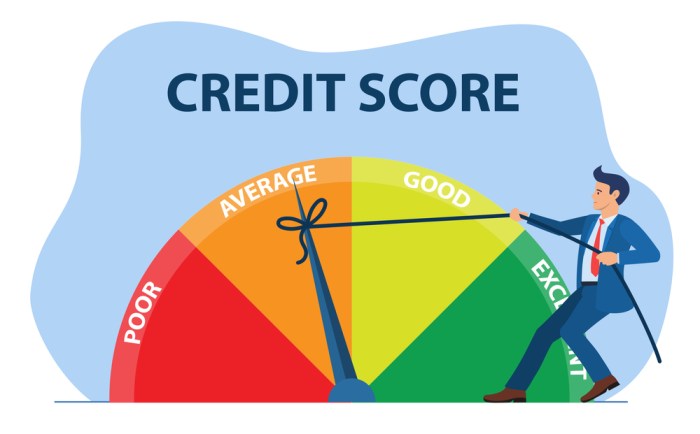Credit score improvement is crucial for financial success in today’s world. Understanding the key factors and strategies to enhance your credit score can open doors to lower interest rates and better financial opportunities. Dive into this guide to unlock the secrets of improving your credit score and securing a brighter financial future.
Importance of Credit Score Improvement

Having a good credit score is crucial for maintaining financial health. It impacts various aspects of your life, from getting approved for loans to securing lower interest rates on credit cards.
Lower Interest Rates on Loans
When you have a higher credit score, lenders see you as less of a risk. This leads to them offering you lower interest rates on loans, saving you money in the long run. For example, a difference of just a few percentage points on a mortgage can amount to significant savings over the life of the loan.
Creditworthiness Assessment
Lenders use credit scores as a tool to assess your creditworthiness. A higher credit score indicates that you are more likely to repay your debts on time, making you a favorable candidate for loans and credit cards. On the other hand, a low credit score can lead to higher interest rates or even outright denials of credit.
Factors Affecting Credit Score: Credit Score Improvement
When it comes to your credit score, several key factors play a crucial role in determining where you stand. Understanding these factors can help you take the necessary steps to improve your credit score and financial health.
Payment History
Your payment history is one of the most significant factors influencing your credit score. It accounts for about 35% of your overall score. Lenders want to see that you can make on-time payments consistently. Late payments, defaults, and bankruptcies can have a negative impact on your credit score. To improve this factor, make sure to pay all your bills on time and in full.
Credit Utilization
Credit utilization refers to the amount of credit you are using compared to the total amount available to you. It makes up around 30% of your credit score. Keeping your credit utilization ratio low shows lenders that you are responsible with credit. Aim to keep your credit utilization below 30% to improve this factor.
Length of Credit History
The length of your credit history makes up about 15% of your credit score. Lenders like to see a long credit history as it gives them more data to assess your creditworthiness. To improve this factor, try to keep older accounts open and in good standing.
New Credit
Opening multiple new credit accounts in a short period can signal risk to lenders and lower your credit score. This factor makes up around 10% of your credit score. Be cautious when applying for new credit and only do so when necessary to avoid a negative impact on your score.
Credit Mix
Having a mix of different types of credit accounts, such as credit cards, loans, and a mortgage, can positively impact your credit score. This factor makes up about 10% of your score. Aim for a healthy mix of credit accounts to improve this factor.
Remember, improving these key factors can help boost your credit score over time and open up opportunities for better financial products and lower interest rates.
Strategies for Credit Score Improvement

Improving your credit score is crucial for your financial health. Here are some actionable steps individuals can take to boost their credit scores.
Make Timely Payments to Enhance Payment History
One of the most significant factors affecting your credit score is your payment history. Ensure you make all your payments on time to establish a positive payment history. Late or missed payments can have a detrimental impact on your credit score.
Monitor Credit Reports for Errors and Correct Them
Regularly monitoring your credit reports is essential to identify any errors or inaccuracies that could be dragging down your credit score. If you spot any mistakes, take immediate steps to correct them by contacting the credit bureaus and providing the necessary documentation to rectify the errors.
Credit Score Improvement Tools and Resources
Improving your credit score can be made easier with the help of various tools and resources that provide valuable insights and guidance. These tools can assist you in monitoring your credit, simulating different scenarios, and managing your finances effectively.
Credit Monitoring Services
Credit monitoring services are essential tools that allow you to keep track of your credit report and score regularly. These services notify you of any changes or suspicious activity, helping you detect and address potential issues promptly. Some popular credit monitoring services include Credit Karma, Experian, and IdentityForce.
Credit Score Simulators
Credit score simulators are tools that help you understand how certain financial decisions may impact your credit score. By inputting different scenarios, such as paying off a loan or opening a new credit card, you can see how your credit score might change. These simulators can be found on websites like CreditWise by Capital One and MyFICO.
Budgeting Apps
Budgeting apps play a crucial role in managing your finances effectively, which can indirectly impact your credit score. By tracking your expenses, setting financial goals, and creating a budget, you can improve your overall financial health. Some popular budgeting apps include Mint, YNAB (You Need a Budget), and PocketGuard.
Credit Counseling Services
Credit counseling services provide personalized guidance and support to individuals looking to improve their credit scores. These services offer advice on budgeting, debt management, and credit building strategies. Organizations like the National Foundation for Credit Counseling (NFCC) and Money Management International (MMI) are reputable sources for credit counseling.
Reputable Websites and Resources, Credit score improvement
There are several websites and resources that offer valuable information and tips on boosting credit scores. Websites like NerdWallet, CreditCards.com, and myFICO provide in-depth articles, tools, and guides on credit score improvement. Additionally, government websites like the Consumer Financial Protection Bureau (CFPB) offer reliable resources on credit education and protection.





